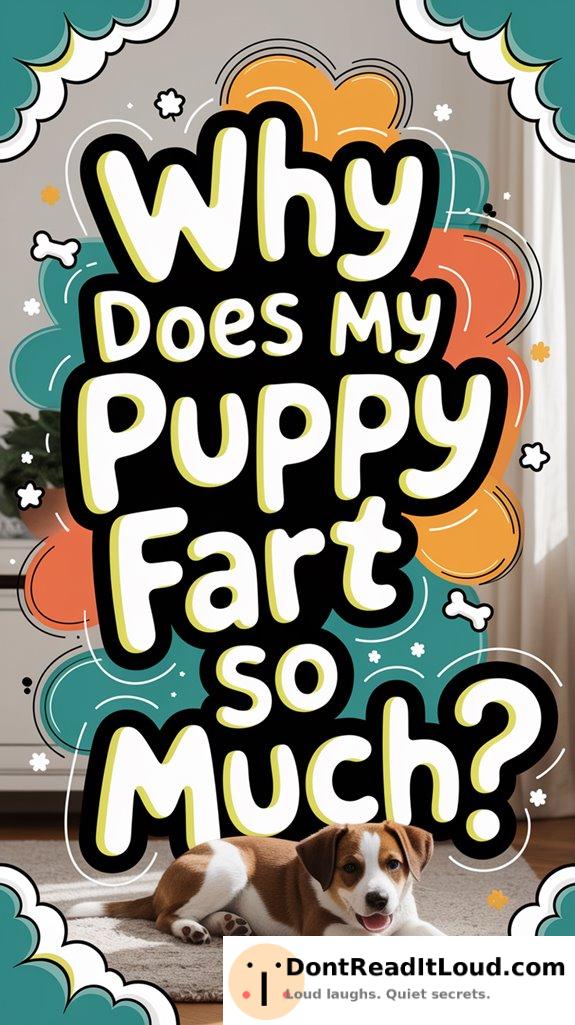
Your puppy’s frequent gas may stem from recent diet changes, eating too quickly, breed traits, or insufficient exercise. Switching foods abruptly can upset their digestion. Diets high in carbohydrates or low-quality ingredients often cause more flatulence. Some breeds, such as Bulldogs and Pugs, are especially prone to gas. Puppies that eat fast tend to swallow extra air, increasing gas. Limited activity can also slow their digestion. Supporting your puppy with a balanced diet and regular exercise can reduce gassiness. Discover more solutions.

Ever wondered why your puppy seems to be a little gas machine? It turns out, several factors contribute to this gassy situation. One of the main gas causes is sudden diet changes. When you switch your puppy’s food abruptly, it can disrupt their digestion, leading to excessive fermentation in the colon. This happens because your pup’s digestive system needs time to adjust to new ingredients.
Feeding habits also play a significant role. If your puppy eats too quickly, usually due to competition with other pets or being fed too soon after exercise, they swallow excess air, a condition known as aerophagia, which contributes to the gas.
Breed factors are another important aspect. Some breeds like Bulldogs, Pugs, and Boxers are more prone to gas due to their facial structure, which makes them swallow more air. Larger breeds like Mastiffs and Great Danes also tend to have more gas because they consume larger meals. Additionally, Bulldogs often struggle with high-carb diets, worsening their digestive health.
Your puppy’s lifestyle impacts their flatulence too. Overweight or sedentary pups are more likely to have chronic gas issues since they may not exercise enough to promote healthy digestion.
Digestive health is vital for preventing excessive gas. Poor-quality food filled with low-quality ingredients, fillers, and artificial preservatives can lead to flatulence. Many dogs are lactose intolerant, so dairy products are often culprits. High-fiber foods like soybeans, beans, and peas, and high-fat diets also contribute to the problem. Spoiled food can be particularly harmful, as it disrupts digestion and results in smelly gas. Swallowed air is a major source of gas, so ensuring your puppy eats calmly and slowly can help reduce this issue.
If your puppy has an underlying medical condition like gastrointestinal diseases or malabsorption issues, these can also cause gas. Conditions like IBD, IBS, and colitis, or even intestinal parasites and pancreatic issues, may prevent proper nutrient uptake, leading to fermentation in the gut.
To manage and prevent your puppy’s gas, consider introducing dietary changes gradually. Feed them highly digestible, low-fiber, low-fat diets, and use slow-feeder bowls or food puzzles to reduce their eating speed, preventing them from gulping air.
Guarantee they get enough exercise to help with digestion, and avoid feeding them right after physical activity. By understanding these factors and making a few adjustments, you can help reduce your puppy’s flatulence and improve their comfort. After all, a happy, healthy puppy makes for a happier home.
Conclusion
Frequent farting in puppies is usually a normal part of digestion, but it can also be caused by diet, swallowed air, or food sensitivities. To help reduce gas, try making gradual changes to their meals and encourage slower eating. If the issue continues, consult your veterinarian for advice. Taking these steps can help your puppy feel better and keep your home more pleasant.



